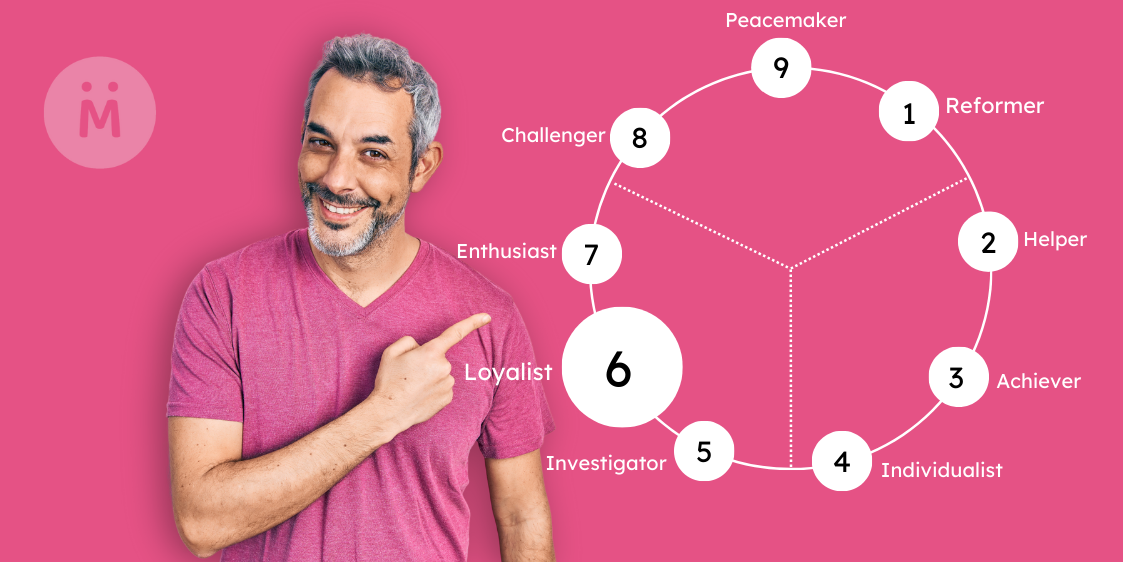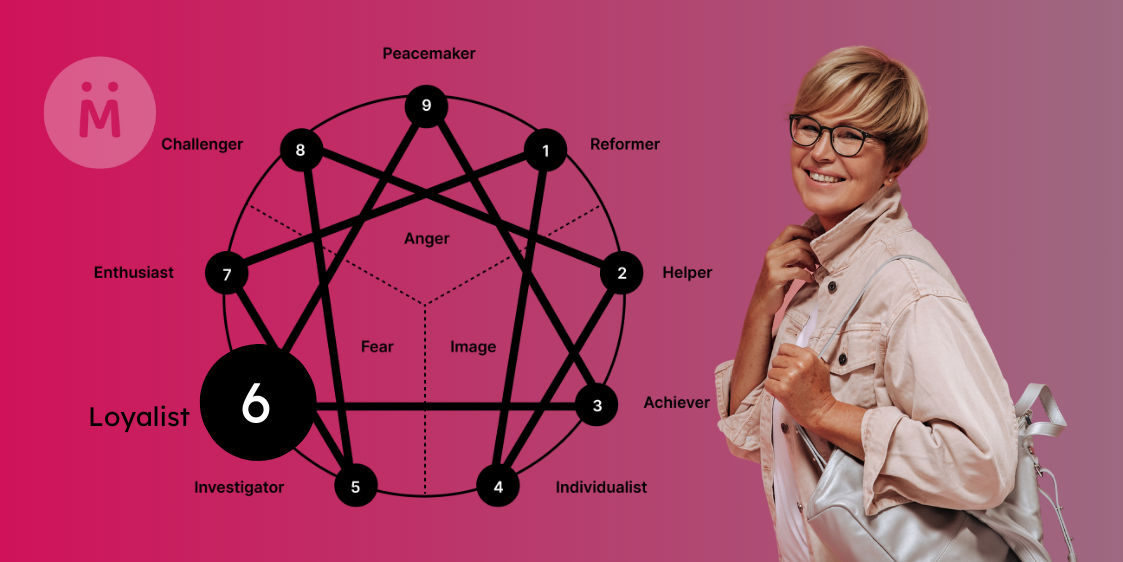Understanding Enneagram Type 6: The Loyalist
Margo Plater

Outstanding Qualities of Enneagram 6 Individuals
- Loyalty: One of your most outstanding qualities is your unwavering loyalty to the people and causes you believe in. You are a steadfast and dedicated friend, partner, and colleague, always willing to support and stand by those you care about.
- Trustworthiness: You are known for your trustworthiness. You take your commitments seriously and can be relied upon to keep your promises and honor your obligations. This makes you an excellent team member and a dependable ally.
- Diligence: Your diligent nature is another exceptional trait. You approach tasks and challenges with thoroughness and a strong work ethic. You are often seen as the one who goes the extra mile to ensure things are done right.
- Preparedness: You excel in being prepared for various situations. You have a keen ability to anticipate potential problems and develop contingency plans. This quality can be invaluable in crisis management and problem-solving.
- Analytical Thinking: Your analytical thinking is a notable strength. You have a natural inclination to analyze information from multiple angles, making you an excellent researcher, strategist, and decision-maker.
Exploring the Enneagram Type 6: Unveiling the Depths of Personal Growth
The Enneagram Test is a psychometric test that aims to decipher what specific personality traits you possess, in hopes of helping you get to know yourself better to implement positive change. There are multiple different results you can get from taking the Enneagram Test, one being Enneagram Type 6. Enneagram Type 6 emerges as a powerful and dynamic personality, driven by a distinctive set of traits and motivations that set it apart from the rest.
In this comprehensive overview, we delve into the depths of Enneagram Type 6, exploring its core characteristics, relationships, tendencies, growth paths, career paths, and unique perspectives. The Enneagram system offers profound insights into human behavior, motivations, and personal development. We'll explore the essential aspects of Enneagram Type 6, shedding light on its core motivations and how it influences our thoughts and actions.
Enneagram Type 6, often known as "The Loyalist" or "The Skeptic," is a fascinating personality type that plays a crucial role in this system. In this comprehensive article, we will delve into the world of Enneagram Type 6, exploring what makes you unique and how your core motivations shape your behavior and relationships.
Introduction to Enneagram Type 6
Enneagram Type 6, often referred to as "The Loyalist" or "The Skeptic," is known for their deep sense of loyalty and commitment. You are a cautious individual who seeks security and stability in your life. Type 6 personalities are driven by a fear of uncertainty, making you an excellent planner and problem-solver.
The Characteristics of Enneagram Type 6
As a Type 6 individual, you are characterized by your loyalty, responsibility, and reliability. You are often seen as a dependable friend and colleague who will go to great lengths to support those you care about. However, your fear of the unknown can sometimes lead to anxiety and overthinking.
Your Inner World as a Type 6
To truly understand yourself as a Type 6, we must delve into your inner world. You are constantly assessing potential risks and threats, which can make you appear skeptical or cautious. This inner turmoil can be exhausting, but it also drives you to be prepared for any situation.
The Role of Your Core Motivations
At the core of every Enneagram type are specific motivations that guide their behavior. For Type 6, your primary motivation is the pursuit of security. You are driven by a need to feel safe and protected, which influences your decisions and actions.
Exploring the Characteristics of The Loyalist
In this comprehensive article, we will delve into the characteristics of The Loyalist personality type. Understanding these traits is essential for personal growth, building relationships, and fostering a better sense of self-awareness. You, as The Loyalist, also known as Enneagram Type 6, possess unique strengths, positive attributes, as well as challenges and potential growth areas. We'll explore these aspects in detail to provide you with valuable insights.
Understanding The Loyalist Personality Type
As The Loyalist, you are marked by your unwavering loyalty, commitment, and a strong sense of responsibility. You are known for your reliability and dependability in both personal and professional relationships. Let's explore your strengths and positive attributes that make you an exceptional individual.
Strengths and Positive Attributes
Unparalleled Loyalty
You are renowned for your loyalty to friends, family, and organizations. You stand by your commitments and are dedicated to the people and causes you hold dear.
Exceptional Problem Solvers
You have a keen ability to anticipate potential issues and are an excellent problem solver. Your cautious nature ensures you're always prepared for the unexpected.
Strong Sense of Responsibility
As The Loyalist, you take your responsibilities seriously, ensuring that you fulfill your duties efficiently. This quality makes you a reliable colleague and friend.
Pragmatic Thinkers
You possess a practical mindset, often offering well-thought-out solutions to complex problems. Your grounded approach is an asset in decision-making processes.
Supportive Nature
You are known for providing unwavering support to your loved ones during challenging times. You are a trustworthy confidant and a pillar of strength.
Detail-Oriented
Your meticulous attention to detail ensures that you rarely overlook important aspects of a task or project, leading to successful outcomes.
Preparedness
You are always prepared for any situation, making you a valuable asset in emergency scenarios. Your cautiousness helps prevent potential disasters.
Commitment to Improvement
You have a strong desire for personal growth and self-improvement, constantly seeking ways to overcome your fears and challenges.
Challenges and Potential Growth Areas
While you, as The Loyalist, possess numerous strengths, you also face challenges that can cause you stress, and hinder your personal and professional development. Identifying these areas of improvement is crucial for your continued growth.
Overthinking
Your tendency to overanalyze situations can lead to anxiety and indecision. Learning to trust your instincts is essential.
Fear of Abandonment
Loyalists may struggle with an intense fear of abandonment, which can strain relationships. Developing self-assurance is key to addressing this challenge.
Reluctance to Change
You can be resistant to change, even when it's necessary. Embracing change and adaptability is vital for your progress.
Seeking External Validation
You often seek reassurance from others. Building self-esteem and relying on internal validation can help mitigate this need.
Cautiousness Turning into Paranoia
Your cautious nature may sometimes border on paranoia, leading to unnecessary worry. Developing a balanced perspective is essential.

Unveiling the Wings of Enneagram 6: Your Unique Characteristics
In this insightful article, we will explore the concept of "wings" within the Enneagram system, focusing on your Enneagram Type 6, also known as "The Loyalist." Understanding how these wings manifest in you can provide a deeper understanding of your personality and behavior. Let's delve into the wings of Enneagram 6 and gain valuable insights into the intricacies of your character.
What are Enneagram Wings?
Before we dive into the specifics of your wings as an Enneagram 6, it's crucial to understand the broader concept. In the Enneagram system, each personality type has adjacent types, known as wings. These wings influence and complement your core personality type, adding unique nuances to your character. As The Loyalist, your possible wing types are Type 5 (The Investigator) and Type 7 (The Enthusiast).
You with a Wing 5: The Problem-Solving Sage
When you exhibit characteristics influenced by your adjacent Type 5 wing, you become the Problem-Solving Sage. This unique blend of traits combines your loyalty and responsibility with the analytical and knowledge-seeking qualities of The Investigator.
Key Attributes of The Problem-Solving Sage
- Analytical Thinker: You possess a natural curiosity and an insatiable desire for knowledge. You excel in dissecting complex issues and finding innovative solutions.
- Cautious Researcher: The Problem-Solving Sage approaches decisions with meticulous research and careful consideration, ensuring that every choice is well-informed.
- Reserved and Thoughtful: You may exhibit a more reserved and introspective demeanor, taking time to ponder and reflect on various matters.
- Balancing Caution with Inquisitiveness: While cautious by nature, you also maintain a sense of curiosity and exploration, striking a unique balance between safety and adventure.
You with a Wing 7: The Adventurous Supporter
When your Type 7 wing comes to the forefront, you transform into the Adventurous Supporter. This fusion combines your loyalty and responsibility with the enthusiastic and spontaneous nature of The Enthusiast.
Key Attributes of The Adventurous Supporter
- Enthusiastic Optimism: You radiate positivity and optimism, bringing a sense of adventure and fun to your loyalty and support.
- Spontaneous Problem Solver: The Adventurous Supporter is quick to find solutions, often thinking on your feet to address challenges.
- Embracing Change: You are more open to change and new experiences, making you adaptable and flexible in various situations.
- Charismatic and Social: With your charismatic personality, you excel in social situations and can motivate others with your enthusiasm.
Embrace Your Wings
Understanding your wings as an Enneagram 6, The Loyalist, provides valuable insights into the diverse facets of your personality. Whether you lean towards the Problem-Solving Sage or the Adventurous Supporter, each combination of traits is unique and brings its strengths to the forefront. By embracing these wings, you can further your personal growth and navigate life's challenges with a deeper self-awareness.
You as The Loyalist in Relationships: Navigating Family, Friendships, and Romance
In this article, we will delve into your world as The Loyalist (Enneagram Type 6) and explore how you navigate various aspects of relationships, including family dynamics and communication, friendships and social interactions, as well as romantic relationships and intimacy. Understanding how you approach these areas is essential for building meaningful connections and fostering healthy bonds.
You as The Loyalist in Family Dynamics and Communication
Your family holds a special place in your heart, and your strong sense of loyalty extends deeply into familial relationships. Here's how you typically navigate family dynamics and communication:
- Loyalty and Support: You are fiercely loyal to your family members, often going to great lengths to protect and support them.
- Open Communication: You value open and honest communication within the family unit, seeking to address issues and conflicts directly.
- Security-Oriented: You may be more focused on creating a sense of security and stability within the family, sometimes leading to a resistance to change.
You as The Loyalist in Friendships and Social Interactions
When it comes to friendships and social interactions, you are a dependable and loyal companion. Here's how you approach these relationships:
- Dependable Friend: You are known for your reliability and willingness to stand by your friends through thick and thin.
- Cautious Approach: You tend to be cautious when forming new friendships, taking time to build trust and assess the loyalty of others.
- Conflict Avoidance: While you value open communication, you may also avoid confrontations in social settings to maintain harmony.
You as The Loyalist in Romantic Relationships and Intimacy
In romantic relationships, you seek security and a deep emotional connection. Here's how you navigate romantic relationships and intimacy:
- Loyalty and Commitment: You are an intensely loyal and committed partner, often making your significant other a top priority.
- Trust and Security: Trust is paramount in your relationships, and you seek partners who provide emotional security and reassurance.
- Fear of Abandonment: You may struggle with a fear of abandonment, which can affect your level of trust and intimacy.
- Communication is Key: You value open and honest communication with your partners, as it helps alleviate your anxieties and build a stronger bond.
Understanding yourself as The Loyalist in relationships reveals a personality deeply rooted in loyalty, commitment, and a desire for security. Whether within your family, friendships, or romantic partnerships, your approach is characterized by your unwavering support and a strong need for open communication. By recognizing and appreciating these qualities, individuals can cultivate more meaningful and fulfilling relationships with you, fostering trust, loyalty, and lasting connections.

Navigating Your Career Path as You, The Loyalist: Your Leadership, Decision-Making, and Overcoming Workplace Challenges
In this article, we will explore your career journey as The Loyalist (Enneagram Type 6) and provide insights into your leadership style, decision-making abilities, and strategies for overcoming workplace challenges. Understanding how you approach your career is essential for both your personal growth and professional success.
Leadership and Decision-Making Abilities
You bring unique qualities to the workplace, making you an effective leader and decision-maker. Here's how you typically navigate leadership roles and decision-making processes:
1. Collaborative Leadership:
- You thrive in leadership positions where collaboration and team cohesion are vital.
- You build trust within your teams by fostering a sense of security and dependability.
2. Cautious Decision-Making:
- When faced with decisions, you tend to be methodical and thorough in your analysis.
- You consider potential risks and benefits extensively, ensuring a well-informed choice.
3. Seeking Support and Validation:
- You may seek input and validation from trusted colleagues or mentors before making significant decisions.
- This collaborative approach enhances your confidence in your choices.
Workplace Challenges and Strategies
While you excel in many aspects of your career, you also encounter specific challenges. Here are some common workplace challenges you may face and strategies to overcome them:
1. Fear of Failure:
- Challenge: The fear of making mistakes or failing can hinder your progress.
- Strategy: Embracing a growth mindset and learning from setbacks can help you overcome this fear and grow.
2. Overthinking and Anxiety:
- Challenge: Overthinking can lead to anxiety, affecting your decision-making.
- Strategy: Practicing mindfulness techniques and seeking support from professionals can help manage anxiety.
3. Resisting Change:
- Challenge: You may resist changes in the workplace, impacting adaptability.
- Strategy: Gradual exposure to change and focusing on the potential benefits can make transitions smoother.
4. Conflict Avoidance:
- Challenge: Your desire for harmony may lead to avoiding necessary confrontations.
- Strategy: Developing assertiveness skills and conflict resolution techniques can address this challenge.
5. Self-Doubt:
- Challenge: Self-doubt can undermine your confidence and hinder career growth.
- Strategy: Regular self-reflection and acknowledging achievements can boost your self-esteem.
Understanding how you, as The Loyalist, approach your career path provides valuable insights into your leadership style, decision-making process, and strategies for overcoming workplace challenges. By leveraging your collaborative leadership, cautious decision-making abilities, and implementing effective strategies, you can navigate your career path with confidence and achieve success while maintaining your unwavering loyalty and commitment.
Growth and Development for You, Enneagram 6: The Loyalist
In this article, we will explore the pathways to growth and development specifically tailored for you as an Enneagram Type 6, commonly known as "The Loyalist." Understanding how to harness your unique characteristics and address potential challenges is essential for your personal and emotional growth.
Embracing Self-Discovery
One of the most powerful tools for your growth as The Loyalist is self-discovery. By delving deep into your own thoughts and behaviors, you can uncover patterns and triggers that influence your actions. Here are some strategies to help you on your journey:
- Mindfulness Practices: Engage in mindfulness meditation to become more present and aware of your thoughts and emotions.
- Journaling: Keep a journal to track your feelings and reactions in various situations, allowing you to identify recurring patterns.
- Seeking Feedback: Don't hesitate to seek feedback from trusted friends or therapists. Their insights can provide valuable perspectives on your behavior.
Building Self-Esteem
Developing a healthy sense of self-esteem is crucial for your growth as The Loyalist. Addressing self-doubt and insecurity can lead to increased confidence and resilience. Here's how you can work on this aspect:
- Positive Affirmations: Incorporate daily positive affirmations into your routine to challenge negative self-talk.
- Self-Compassion: Treat yourself with kindness and understanding, particularly when facing challenges or making mistakes.
- Setting Achievable Goals: Break down your goals into manageable steps, celebrating your successes along the way.
Managing Anxiety
Anxiety is a common challenge for Enneagram 6 individuals. Learning to manage it effectively is key to your personal development. Consider these strategies:
- Breathing Exercises: Practice deep breathing techniques to calm your mind during moments of stress or anxiety.
- Therapeutic Interventions: Cognitive-behavioral therapy (CBT) or mindfulness-based therapy can provide effective tools for managing anxiety.
- Stress Reduction: Incorporate stress-reduction techniques such as yoga, exercise, or hobbies into your daily life.
Embracing Change
As The Loyalist, you may have a natural resistance to change. Embracing change is an essential aspect of your personal growth. Try the following:
- Gradual Exposure: Gradually expose yourself to new experiences and changes, allowing time for adjustment.
- Focus on Positives: Concentrate on the potential benefits and growth opportunities that change can bring.
Strengthening Relationships
Your relationships can be a source of both support and growth. Nurture them by:
- Open Communication: Practice open and honest communication with your loved ones to build trust and intimacy.
- Empathy: Develop empathy for others' perspectives and emotions, fostering stronger connections.
- Conflict Resolution: Learn conflict resolution skills to address disagreements in a constructive and healthy manner.
Embracing growth and development as The Loyalist requires self-awareness, self-esteem building, anxiety management, and a willingness to embrace change. By applying these strategies and focusing on strengthening your relationships, you can navigate your Enneagram Type 6 journey with confidence and achieve personal and emotional growth.

Your Guide to Self-Care and Stress Relief as You, The Loyalist
In this comprehensive guide, we will explore effective strategies for self-care and stress relief tailored to you as The Loyalist, an Enneagram Type 6. Understanding how to prioritize self-care and manage stress is crucial for maintaining your well-being and mental health.
Understanding Your Self-Care Needs
As The Loyalist, you are known for your loyalty and commitment to others. However, it's essential to extend that same level of care and support to yourself. Here's how you can identify your self-care needs:
- Self-Reflection: Take time to reflect on your emotions, thoughts, and physical sensations. Identify moments when you feel stressed or overwhelmed.
- Recognize Triggers: Identify the situations or stressors that trigger your anxiety or unease. Understanding these triggers is the first step toward self-care.
- Prioritize Self-Compassion: Practice self-compassion by treating yourself with kindness, especially during challenging times.
Self-Care Strategies
1. Mindful Meditation and Relaxation Techniques
- Engage in mindfulness meditation to stay present and reduce anxiety.
- Practice deep breathing exercises to calm your mind during stressful moments.
- Explore relaxation techniques such as progressive muscle relaxation to release tension.
2. Establishing Routine and Structure
- Create a daily routine to provide a sense of stability and predictability.
- Set achievable goals and break them down into manageable steps to reduce overwhelm.
- Prioritize tasks and responsibilities to maintain a sense of control.
3. Seeking Support
- Don't hesitate to reach out to friends, family, or a therapist for emotional support and validation.
- Build a strong support network that you can rely on during challenging times.
4. Embracing Change Gradually
- If change is causing stress, expose yourself to new experiences gradually to ease the transition.
- Focus on the potential benefits and growth opportunities that change can bring.
Stress Relief Strategies
1. Engaging in Physical Activity
- Incorporate regular exercise into your routine to reduce stress and boost your mood.
- Activities like yoga, walking, or swimming can be particularly beneficial.
2. Creative Outlets
- Explore creative hobbies such as painting, writing, or playing a musical instrument as a means of self-expression and stress relief.
3. Time Management
- Use time management techniques to prioritize tasks and avoid last-minute rushes.
- Delegate responsibilities when possible to reduce your workload.
4. Grounding Techniques
- Use grounding exercises, like focusing on your senses or deep breathing, to stay centered during moments of stress.
Prioritizing self-care and stress relief as You, The Loyalist, is essential for your well-being. By understanding your unique needs and implementing effective strategies, you can navigate life's challenges with resilience and maintain a sense of balance and stability. Remember that taking care of yourself is not only a gift to yourself but also enables you to continue being the dependable and supportive person you are to others.
Enneagram Type 6 in Popular Culture: Fictional Characters and Celebrity Examples
In this exploration of Enneagram Type 6, also known as "The Loyalist," we will delve into popular culture to uncover notable fictional characters and celebrities who embody the characteristics of this personality type. Understanding how The Loyalist manifests in different contexts can provide valuable insights into their traits and behaviors.
Notable Fictional Characters
1. Hermione Granger (Harry Potter Series):
- Hermione's unwavering loyalty to her friends and her commitment to learning align perfectly with The Loyalist's traits.
- Her cautious nature and tendency to seek knowledge and preparedness are also characteristic of this personality type.
2. Samwise Gamgee (The Lord of the Rings):
- Sam's loyalty to Frodo and his determination to protect him on their journey mirror The Loyalist's strong sense of commitment to loved ones.
- He exemplifies courage and responsibility, even in the face of danger and uncertainty.
3. Liz Lemon (30 Rock):
- Liz's diligent and responsible nature in managing her career and personal life resonates with The Loyalist's desire for stability and security.
- Her cautious approach to relationships and her tendency to plan for potential pitfalls align with this personality type.
Celebrity Examples and Analysis
1. Julia Roberts:
- Julia Roberts, known for her loyalty to her craft and her ability to maintain a long-standing career in Hollywood, exhibits The Loyalist's commitment.
- Her careful choice of roles and her cautious approach to fame reflect the traits of this personality type.
2. Tom Hanks:
- Tom Hanks, beloved for his reliability and consistency in delivering powerful performances, embodies The Loyalist's dependable nature.
- His dedication to his craft and his reputation for being one of the most likable actors in Hollywood align with this personality type.
3. Meryl Streep:
- Meryl Streep's impressive body of work and her unwavering commitment to her craft showcase The Loyalist's dedication and loyalty.
- Her meticulous preparation for roles and her ability to adapt to diverse characters reflect the traits of this personality type.

Misconceptions About You, The Loyalist: Distinguishing Myths from Reality
In this exploration of your Enneagram Type 6, often referred to as "The Loyalist," we aim to dispel common misconceptions that surround your personality type. By distinguishing myths from reality, we can gain a deeper understanding of your true nature and characteristics.
Myth 1: You are Always Anxious
Reality: While it's true that you, as The Loyalist, can be prone to anxiety, it's a misconception to think that you are constantly in a state of worry. Anxiety is just one aspect of your personality, and you have the capacity to experience a wide range of emotions, including confidence, happiness, and calmness. Like anyone else, your emotional state varies depending on circumstances and personal growth.
Myth 2: You are Inflexible and Resistant to Change
Reality: While you may have a cautious approach to change, it doesn't mean you are completely inflexible. You may initially resist change due to your desire for security, but with time and understanding, you can adapt and even embrace new experiences. Your cautiousness is a form of preparedness rather than rigid inflexibility.
Myth 3: You Always Need Reassurance
Reality: While seeking reassurance is a common trait for you as The Loyalist, it doesn't mean you are constantly seeking validation from others. You value reassurance as a means to alleviate your anxieties and fears, especially in moments of uncertainty. With personal growth, you can become more self-reliant and less dependent on external validation.
Myth 4: You are Pessimistic
Reality: Your cautious nature can sometimes be mistaken for pessimism. You may focus on potential risks and drawbacks as a way to be prepared, but it doesn't mean you lack a positive outlook. In fact, you can be highly optimistic about your ability to handle challenges and create a secure environment for yourself and your loved ones.
Myth 5: You are Overly Dependent on Others
Reality: While you value your relationships and seek support from trusted individuals, it's a misconception to label you as overly dependent. You have the capacity to be self-reliant and make independent decisions when necessary. Your loyalty and commitment to others should not be confused with dependency.
The Enneagram Journey: From Awareness to Your Personal Transformation
In this profound exploration of the Enneagram, you embark on a transformative journey that takes you from self-awareness to your personal evolution. The Enneagram, a powerful tool for understanding personality types and their underlying motivations, offers you a path toward continuous growth and evolution.
Steps to Self-Discovery
1. Discover Your Enneagram Type:
- Begin your journey by identifying your Enneagram type. This initial step of self-discovery is crucial for understanding your core motivations, fears, and desires.
2. Explore Your Type's Characteristics:
- Delve deeply into the traits and tendencies associated with your Enneagram type. This exploration will shed light on why you behave the way you do.
3. Recognize Your Triggers and Patterns:
- Pay close attention to the triggers that lead to specific behaviors and emotional reactions. Identifying these patterns is a crucial step toward self-awareness.
Continuous Growth and Evolution
4. Practice Self-Reflection:
- Regular self-reflection allows you to examine your thoughts, emotions, and actions. It enables you to gain insights into your motivations and behavior.
5. Embrace Vulnerability:
- Be open to vulnerability and self-compassion. Understand that your Enneagram type is not a limitation but a starting point for your growth.
6. Seek Support and Guidance:
- Consider seeking guidance from Enneagram experts or therapists who can provide personalized insights and strategies for your growth.
7. Challenge Your Comfort Zone:
- Growth often happens outside your comfort zone. Challenge yourself to confront fears and step into unfamiliar territory.
8. Cultivate Empathy:
- Develop empathy not only for others but also for yourself. Understand that your Enneagram type is a result of your unique life experiences.
Personal Transformation
9. Integrate Healthy Traits from Other Types:
- Embrace the positive traits of other Enneagram types to balance your personality and overcome limitations.
10. Practice Mindfulness and Presence:
- Cultivate mindfulness to stay present and make conscious choices rather than reacting based on unconscious patterns.
11. Empower Others:
- As you transform, empower those around you by sharing your Enneagram insights and supporting their growth journeys.
Conclusion
The Enneagram journey is a profound exploration of self-awareness, continuous growth, and your personal transformation. By understanding your Enneagram type, recognizing triggers and patterns, and embracing vulnerability, you embark on a path towards becoming the best version of yourself. Through self-reflection, seeking support, and challenging your comfort zone, you evolve into a more empathetic and empowered individual. The Enneagram is not just a tool; it's your guide to a life of self-discovery, growth, and lasting transformation.
Ultimately, the Enneagram serves as a valuable tool for personal development and self-awareness, offering individuals the opportunity to embark on a journey of self-discovery, transformation, and continuous growth. By embracing their unique qualities and addressing their challenges, Enneagram Type 6s can unlock their full potential and lead more fulfilling lives.



